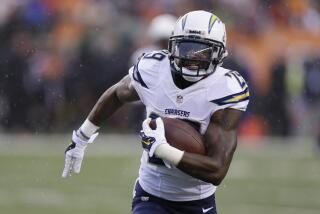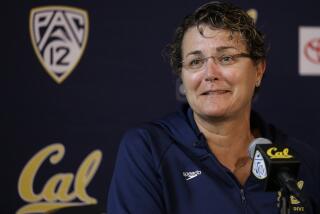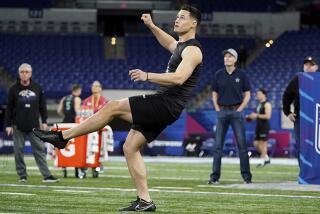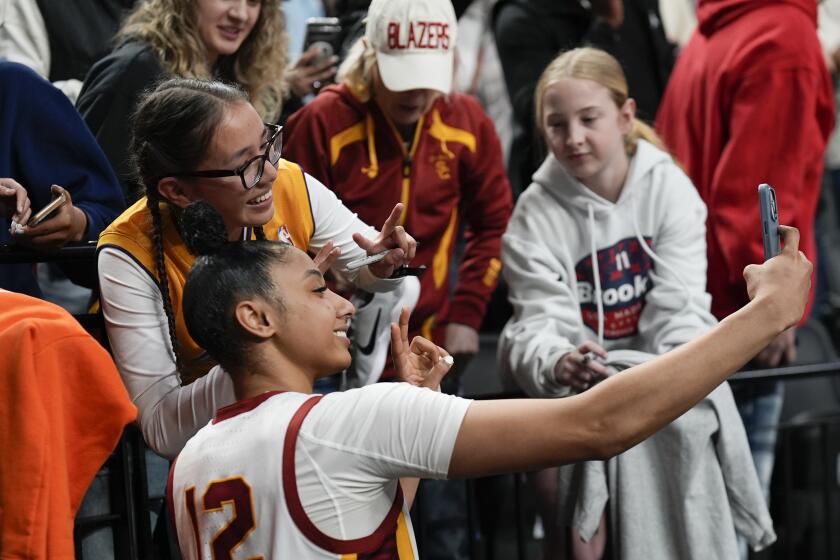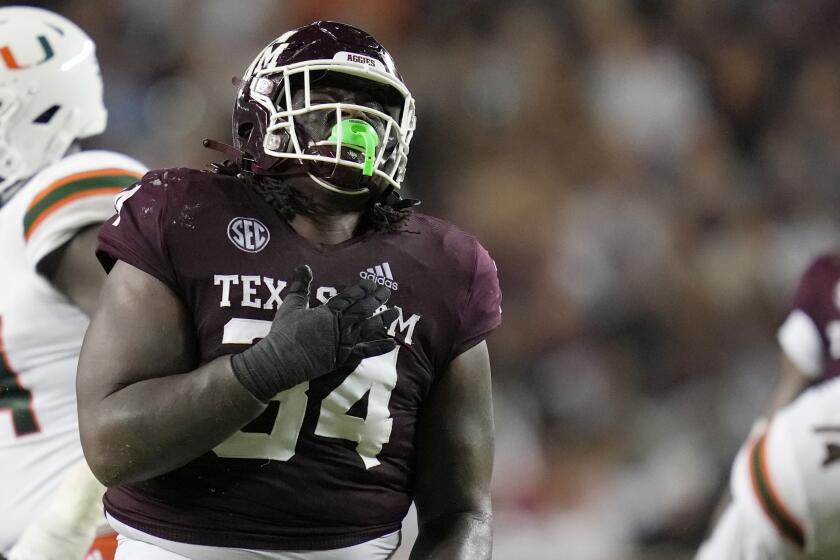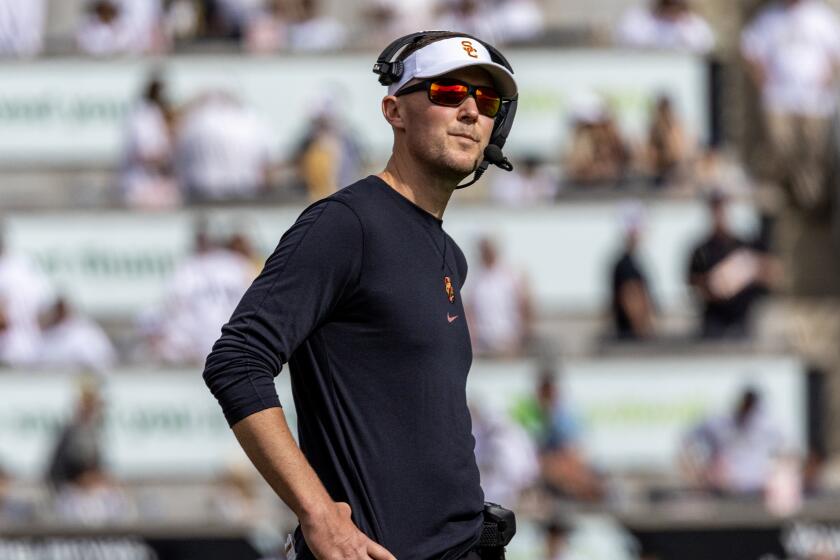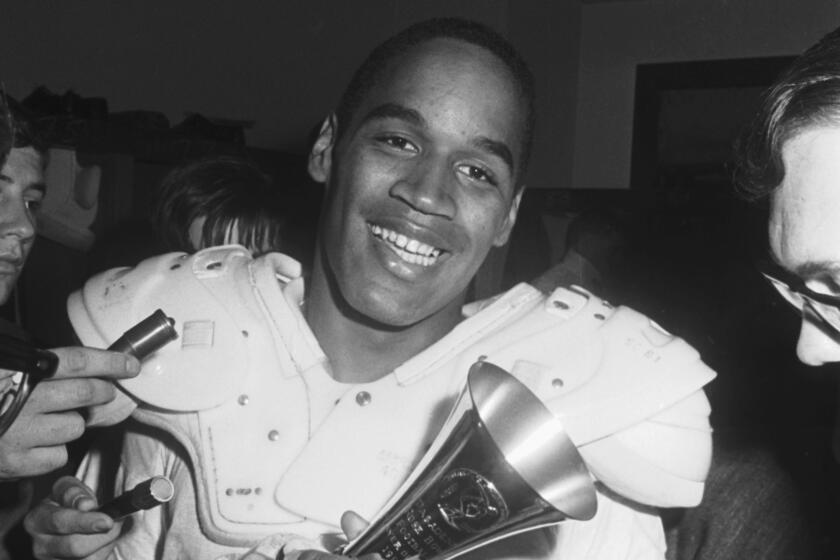Former USC football assistant Todd McNair loses defamation case against NCAA
A Los Angeles County Superior Court jury found Monday the NCAA did not defame former USC assistant football coach Todd McNair in the long-running case linked to the Reggie Bush extra benefits scandal.
The jury didn’t make it past the third of nine questions on the verdict form: whether statements the NCAA infractions committee and appeals committee made about McNair were false. The group voted 9-3 against McNair on the question.
McNair’s voice quavered during brief comments in a fifth-floor hallway at the Stanley Mosk Courthouse: “I’d like to thank all the Trojan faithful, all the fans for supporting me the last seven years. It’s been incredible. It means a lot.”
McNair sued the NCAA in June 2011 after the NCAA infractions committee found him guilty of unethical conduct in connection with the Bush case. The group sanctioned him with a one-year “show cause” penalty — making it difficult for him to find another college job — and USC declined to renew the coach’s contract.
During the three-week trial, McNair attorney Bruce Broillet accused the infractions committee of changing key evidence related to McNair in order to connect the coach to the Bush scandal and increase sanctions against USC.
McNair, whose two days of emotional testimony grabbed the jury’s attention, hasn’t coached at the college or professional levels since being sanctioned. He told the nine women and three men on the jury about sinking into depression after the infractions committee’s decision, drinking heavily, taking out loans from friends and family, using food stamps and driving for Uber to make ends meet.
The jury spoke to attorneys from both sides in the hallway after the verdict. Two of the three jurors who voted for McNair hugged his wife Lynette as she fought back tears.
“God’s got you,” one juror said.
“I feel it was the wrong verdict,” another said.
The jury foreman, Anthony Bruno, told the group the evidence was “screaming out” for the jury to act, but they didn’t have the appropriate legal tool to do so since they didn’t consider the defamation claim strong enough.
“I don’t think the NCAA should come away from this thinking they did things right,” Bruno said.
McNair’s complaint also alleged breach of contract and negligence, but his attorneys withdrew the counts before closing arguments. Broillet declined to comment on the decision.
The head juror speculated McNair could’ve won on both counts had they remained. The jury sent a question to Judge Frederick Shaller last week asking why the counts had been dropped; the judge instructed them not to consider the matter during deliberations.
As the NCAA’s legal team exchanged hugs nearby, Broillet spoke in a low voice: “We’re assessing the situation and considering our next steps. … We’re very disappointed.”
A series of incendiary emails between nonvoting members of the committee were key exhibits during the trial, including one from NCAA infractions committee liaison Shep Cooper in February 2010 that described McNair as a “lying, morally bankrupt criminal and hypocrite of the highest order.”
NCAA attorney Kosta Stojilkovic argued the emails were simply a distraction and that the infractions committee rightly penalized McNair, and the coach’s problems landing another job stemmed from not sending out enough applications.
During closing arguments, Broillet asked the jury for $27 million in damages. Stojilkovic responded that McNair’s legal team “should be embarrassed” for seeking such a large amount.
McNair claimed the NCAA’s infractions committee and appeals committee, which upheld the penalty, libeled him in their final reports by printing information they knew to be false. He also accused NCAA President Mark Emmert of slander for telling USA Today in December 2010 the infractions committee “got it right, I think” in the Bush case.
After the first day and a half of deliberations, the jury sent a note to Shaller on Tuesday: “What do we do if we are deadlocked?” The judge said the deliberations included “more than just gentle disagreement.” But the group’s discussions continued.
The jury’s problems resurfaced Thursday. They sent another note to Shaller saying one of the jurors couldn’t understand evidence in the case because she isn’t conversant in English. Fifteen minutes after the judge decided to keep the juror, the group said they remained deadlocked on the third question on the verdict form.
Shaller was inclined to declare a mistrial if the jury couldn’t progress by that afternoon. But when the jury foreman asked for an interpreter to assist the juror struggling to understand English and McNair’s attorneys expressed concern the juror wasn’t actively participating in deliberations, Shaller dismissed her and summoned an alternate.
Then deliberations started from the beginning. The group spent about seven hours over parts of three days discussing the case before reaching a decision.
“We appreciate the time and care the jury devoted to this case. After seven years of litigation, we are pleased the jury found clearly that the NCAA’s actions did not defame Mr. McNair,” Donald Remy, the NCAA’s chief legal officer, said in a statement. “We hope that the decision will allow the NCAA, USC and Mr. McNair to move on.”
Twitter: @nathanfenno
More to Read
Go beyond the scoreboard
Get the latest on L.A.'s teams in the daily Sports Report newsletter.
You may occasionally receive promotional content from the Los Angeles Times.
